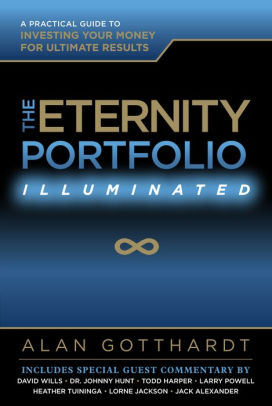More than a decade ago, The Eternity Portfolio presented a groundbreaking framework for managing your money intentionally to invest in God’s kingdom. Grounded in the historical Christian belief that to the extent we have food, clothing, and shelter, we must decide what to do with the “excess,” financial advisor Alan Gotthardt cast a vision for God’s kingdom as the ultimate investment opportunity for that excess, whether $100 or $1 million.
Gotthardt’s flexible, practical strategy will equip anyone with the tools to make an Eternity Portfolio an integral part of a solid financial plan. Times change and methods change, yet biblical principles endure. Building on the framework of the first edition, the author has expanded and illuminated the content based on more than a decade of observations, questions, and experience engaging audiences and advising families. This new edition also features seven other world-class, kingdom investors who add their perspective with annotations throughout.
Gotthardt delves deeper into questions such as:
“How much is enough?”
“How do I balance my Family Portfolio with my Eternity Portfolio?”
“Isn’t it selfish to seek eternal rewards?”
“How should entrepreneurs allocate capital between kingdom enterprises?”
“When it comes to selecting recipients, how do I give wisely?”
“How do I help without hurting?”
“Have things changed since the Great Recession?”
“How do I teach my children about generosity?”
Never before in history have so many Christians―rich and poor―been focused on stewarding their material possessions in light of Christ’s kingdom. Now The Eternity Portfolio, Illuminated brings expanded insight to empower those already on the journey of generosity, as well as wisdom for the coming generations who desire to be intentional about their finances in light of eternity.
- Quote: “I denied myself nothing my eyes desired; I refused my heart no pleasure.” — Solomon (34)
- Quote: “To lay up treasure in heaven, we must invest in what will be there — God and people.” — David Wills (35)
- Note: Focus on people from down here, because they will be up there as well.
- Note: Time on earth is short, so invest in kingdom things like people and God’s economy. If you focus on the wrong things, God will judge and it can mess up not only your earthly life but also your eternal life.
- Note: It’s okay to be wealthy in money, but know where your heart lies. If you are fulfilled with the Spirit, then money won’t affect your actions or happiness.
- Quote: “I wish to add joy to the obligation and opportunity of giving. I have come to realize that one of the great joys of life is giving to others.” — Dr. Johnny Hunt (43)
- Note: Hunt realizes giving is more important than receiving.
- Quote: “Far from being an obligation, giving is a ‘disciplined passion.’ A generous giver told me once that when he gets a windfall bonus or profit, ‘We don’t go shopping at the mall, we go shopping in the world.’” — Todd Harper (43)
- Note: You must be disciplined to develop a passion.
- Note: There are three types of rewards in the kingdom of heaven: crowns, authority, and treasures.
- Note: It’s okay to seek eternal rewards. You’re only here for a short period of time. It’s important to prioritize how you will seek these rewards. This requires a vision.
- Quote: “The process of planning creates clarity, and clarity results in purpose. Purpose reduces fear and brings more clarity.” — David Willis (64)
- Note: Fear can be indirectly taken away by planning.
- Quote: “Have the freedom to say no: ‘What you’re doing is a wonderful thing you are doing for God’s kingdom, but it’s not what he’s put on my heart.’” — Larry Powell (64)
- Note: Someone’s service may not be yours. Somebody being a doctor might be nice, but it may not be what God is calling someone else to do.
- Note: When a person plans, that type of discipline turns into excitement, which turns to happy giving.
- Note: Don’t give for man to see; God doesn’t approve of that kind of giving. Man needs to give only for God to see for his heart to be filled with the Holy Spirit.
- Quote: “It’s quite a challenge to sit from time to time and ponder this question: ‘How much would I have to have to give what I sense God wants me to give?” — Todd Harper
- Note: The amount can be difficult to think of when you could give a lot, but don’t know when or if it’s enough.
- Quote: “Am I more in love with the kingdom of God than the Kingdom of this world?” — Jack Alexander
- Note: When sin is built within us, it’s easy to love the kingdom of the world by getting distracted. How much someone can love the world is dependent on how much time he spends on God.
- Note: Prayer can help when a family or individual is spending outside of their means.
- Note: Exponential generosity requires being systematic, proportionate with managing house and work finances, and making sure needs are met for giving to others. When generously giving in an exponential way, set aside an account that remains untouched.
- Quote: “The concept of enough is a challenging one. Godly wisdom teaches it is to work hard, live beneath our means, and save for the future.” (111)
- Quote: “Let me be clear that financial independence is not necessarily when you take up golf or gardening as a full-time occupation. It does not mean you quit working.” (113)
- Note: Throughout this chapter, Alan Gotthardt emphasizes the importance of the financial finish lines, then describes what the “finish line” is. Furthermore, he talks about how much is enough as we are all different, and that having enough does not always mean stop working. Gotthardt concludes with what we should expect when we cross the “finish line,” which he describes as not the end of life but instead the end of the need to invest in a Family Portfolio.
- Quote: “It’s clear that these commands of Jesus should affect the way we live. But they should also affect the way we give! As Christians, we should build our Eternity Portfolio to carry out the great commandments and fund the great commission. The resources God has provided over and above our needs should be invested to share the love of God with others.” (131)
- Quote: “As the love of Christ is lived out in our lives, a natural result is that we love helping people, especially those who can’t help themselves. We can also see this emphasis in the early church, which organized a task force for collecting and administering gifts to the poor.” (141)
- Note: It is very obvious from the quotes above that this chapter speaks of helping those who are in need. This chapter fits in well with what we have been learning/taught throughout the semester: It is better to give than receive. Gotthardt also writes that the church should be the leader in this giving process. Besides the topic of sharing with others, he also gives some advice about where we should invest and the types of investments we should make.
- Quote: “Accountability is key. Whether managing a traditional investment portfolio or the Eternity Portfolio, faithful managers are accountable and require this virtue in their investment.” (156)
- Quote: “Be careful there are no prideful or self-serving motives driving your investment. You might find it helpful to identify any potential conflicts of interest between your personal benefits and the Kingdom benefits.” (168)
- Note: Gotthardt speaks about accountability and how it would benefit all parties. Furthermore, he discusses on what to look for in a good investment. As the quote above says, we should not have pride be the driver as we invest, but instead invest with a better reason.
- Quote: “You may be already ‘running well’ from the perspective of your Eternity Portfolio. Or perhaps you are just getting started. If you are faithful to invest for the kingdom during this lifetime, your reward will be great. But there is something bigger. Start thinking now about finishing well so that you create a legacy that outlasts you.” (189)
- Quote: “You might think that the only way to leave a legacy is by virtue of a massive financial fortune accumulated over a lifetime. Although we will discuss opportunities to use wealth in this way, the highest return potential actually has little to do with the dollar you leave. Training others to be faithful managers offers a greater reward because in some way you will share in the rewards of their efforts.
- Note: Training the next generation is important. As I have shown in one of the quotes above, it isn’t money that really matters in this concept. Money comes and goes. However, it’s the training. Teaching the concepts, tools, and techniques to the next generation will not bring in money, but instead more ideas for the next generation.
- Quote: “Investing is more art than science. There is no one ‘best way’ to achieve the desire of result. However, though there are many methods for successful investing, a few guiding principles will take you a long way towards success no matter what the details.” (211)
- Quote: “In much the same way, there [are] new keys to success when you’re investing for eternity. Each key unlocks a part of God’s heart and strategy for your Eternity Portfolio. Use the keys as a road map to direct your steps through much prayer and study of the Scriptures. Use them as an anvil on which to crush improper motives, beliefs, and actions. Use them as a window through which you see more clearly God’s plan for your world and a part of it.” (211)
- Quote: “Use the keys to unleash the incredible joy that comes from the integration of your whole being — time, talents, and treasure — into God’s unique purpose for you.” (211)
- Note: In this chapter, Alan Gotthardt provides principles which we can use to invest for eternity. He writes about how can we do this and honor God. At the end of this chapter, he talks about opportunity and how we should not miss out on what God has placed right in front of our eyes. “Don’t miss out.” (22) However, we should not be completely focused on earthly treasures but instead “seek a reward that forever remains just over the horizon.” (222)

